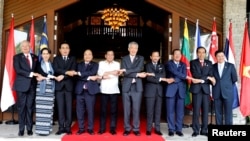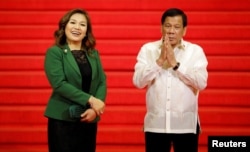Philippine President Rodrigo Duterte opened the last day of a four-day Association of Southeast Asian Nations (ASEAN) summit with a warning that they all are facing a massive “illegal drug trade apparatus.” He quickly added Saturday that the drug trade is not “impregnable” and can be dismantled “with political will and cooperation.”
He urged the leaders from the 10 ASEAN countries gathered in Manila to be “resolute in realizing a drug-free ASEAN.”
Duterte also took an oblique swipe at Western governments, asking them not to meddle in the affairs of regional countries.
Duterte has often lashed out at Western criticism of his brutal anti-drug crackdown. Although couched in diplomatic tone, the president’s remarks at the opening ceremony of the Association of Southeast Asian Nations in Manila reflect his combative character.
Ties between ASEAN and the West could become stronger and more productive “if we learn to respect each other’s independence and treat each other as sovereign equals,” Duterte said. “Relations bear fruit when they are based on mutual respect and benefit.”
No criticism of China
The summit has not yielded any criticism from the leaders about China over its expansion in the contested South China Sea, a sign, some analysts say, of Beijing’s economic and diplomatic influence.
Analysts and media reports earlier in the week expected a mildly worded closing statement without naming any one country as a troublemaker.
Any slight against China, such as a reminder that it lost a world court arbitration ruling July 12 over the legal basis for its claim to 95 percent of the sea, would be “unnecessarily provocative,” said Collin Koh, maritime security research fellow at Nanyang Technological University in Singapore.
“Most of those statements related to such sensitive issues like the South China Sea tend to be very general and wouldn’t go down to specifics, even including highlighting any particular country as singled out for some kind of reprimand in the statement,” Koh said.
Hesitation to criticize China shows the impact of Beijing’s aggressive negotiations with individual Southeast Asian countries and offers of economic benefits since the arbitration ruling. China’s coast guard activity, land reclamation work and construction of military bases in the 3.5 million-square-kilometer have previously caused alarm.
Duterte anti-drug campaign
Duterte has been fanatical about making the Philippines drug-free.
Philippine police report killing 2,724 people in the president’s drug campaign. Human Rights Watch, however, says since Duterte came into office in June 2016, police and unidentified gunmen have killed more than 7,000 suspected drug users and dealers.
Earlier in this week, a Philippine lawyer filed a complaint with the International Criminal Court, accusing Duterte of “mass murder” in his drug campaign.
The Associated Press contributed to this report.





